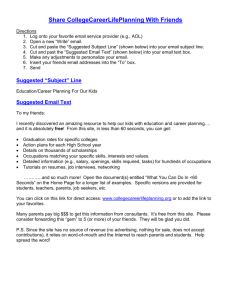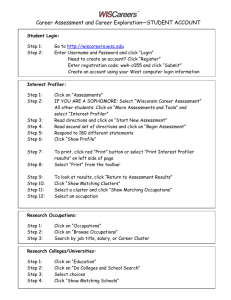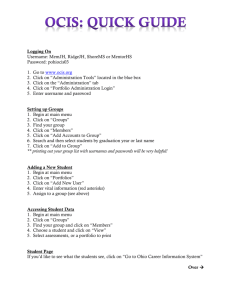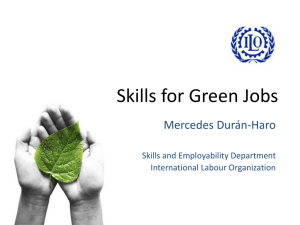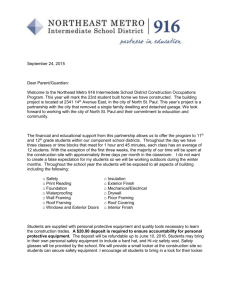Facilitator Trainer Guide for College Access
advertisement
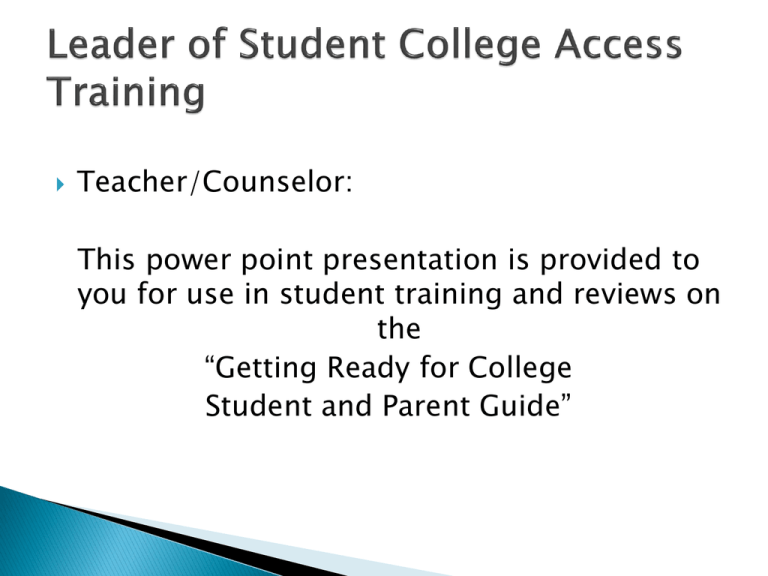
Teacher/Counselor: This power point presentation is provided to you for use in student training and reviews on the “Getting Ready for College Student and Parent Guide” The training guide (Teacher/Counselor Guide for College Access! HIGH SCHOOL – YOUR LIFE – YOUR FUTURE) has a separate powerpoint as this one is for the “Getting Ready for College Guide” only. That guide is designed for you to use in training with student who will also have a copy of the Freshman Student Guide. The lessons, suggestions and comments in your leader guide are designed to help you with your presentations to students and in training all students for access into college. A Student and Parent Guide Getting Ready for College: A Student and Parent Guide High School – Your Plan – Your Future: A Freshman College Access Guide A Website for College Access Sponsored by Palau Ministry of Education and College Access Grant Other Materials and Resources Your Network: Parents, Friends, Counselors, Extended Family Members, Mentors Today’s world ◦ Impact of technology ◦ Basic skills of: Reading, writing, and math Skills to work in teams, Skills to make decisions, Skills to solve problems, Skills to analyze/interpret data, and Skills to effectively communicate Education Past High School 75% of new jobs being created Earn your high school diploma taking higher level skills Why? Entrance requirements for colleges have increased Be sure you are ready! Interests and abilities Match your interests to occupations Plan now to meet the requirements Know Yourself! College Access and College Planning Goal: To provide tips for students to consider when making decisions about their futures! Students gather into 9 groups. Each group will be given a page of information to discuss Each group should have a recorder who writes down points of the discussion 10 minutes to discuss your square and be prepared to share with the class Don’t Give Up. High school dropouts have a harder time getting and keeping jobs. Almost every job requires the basic communication and math skills you’re learning in school today. Take challenging courses. Build a strong foundation of high-level classes, starting with algebra I and geometry by the eighth and ninth grades, and continue to take rigorous courses in high school will better prepare you for college admissions tests and college course work. Plan your career. Once you know what career area you’re headed for, think about the steps you’ll take to get there. Have a plan in mind. Set some goals and document your progress toward reaching those goals. Keep records of career related activities, jobs, and accomplishments. Don’t stop with high school. More career options will be available to you with more education. This doesn’t mean that a four-year degree is the only ticket to high wage/high skill jobs. Occupational certificates and community college degrees can be just as important as a bachelor’s degree when it comes to finding excellent job prospects. Develop basic computer skills. Technology continues to change the workplace and more jobs in the future will require the use of a computer. Take every advantage in courses and personal use to learn how to use computers and their programs. Gain valuable work experience. Learning by doing is a great way to research careers and gain some work experience. Career and technical programs, internships, part-time jobs, job shadowing, youth apprenticeship, and volunteer work are some examples of ways to get hands-on experience while still in school. Employers will value this experience. Find out what careers are out there. The ideal job for you may be something you have never heard or thought about. Think about the skills and education you’ll need in addition to job availability and salary potential. Ask about financial aid. Don’t let the lack of funds keep you from planning additional education past high school. Explore with your counselor the many options available to help you finance your way to a vocational center, community college, or university. Keep learning. Life- long learning. That’s what it’s all about. Take every opportunity to learn new skills. Technology continues to change jobs and the workplace so part of your being successful will depend on how adaptable you are to change. Don’t Give Up. High school dropouts have a harder time getting and keeping jobs. Take challenging courses. Plan your career – ◦ ◦ ◦ ◦ ◦ ◦ What career area Steps you’ll take to get there Have a plan in mind Set some goals Document your progress toward those goals Keep records of career related activities, jobs, and accomplishments. More education = more career options Choices to high wage/high skill jobs: ◦ 4-year university/college degree ◦ Occupational certificates ◦ Community college degrees MORE IS BETTER! Technology continues to change the workplace and more jobs in the future will require the use of a computer. Take every advantage in courses and personal use to learn how to use computers and their programs. Learning by doing is a great way to research careers and gain some work experience which is listed with the advanced education for most developing and demand jobs. Hands-On can mean: ◦ ◦ ◦ ◦ ◦ ◦ Career and technical programs, Internships, Part-time jobs, Job shadowing, Youth apprenticeship, and Volunteer work The ideal job for you may be something you have never heard or thought about. Think about the skills and education you’ll need in addition to job availability and salary potential. Don’t let the lack of funds keep you from planning additional education past high school. Explore with your counselor the many options available to help you finance your way to a vocational center, community college, or university. You will be surprised! Life- long learning means life, not just high school or college! Take every opportunity to learn new skills. Adapt to the world of Technology Goal: To learn more about personal workrelated interests. Your interests and likes related to occupations can help you focus on the cluster of occupations and not just on a job as “that job” may not exist in the next several year. NOT a test! No right or wrong answers! Results will help you to know jobs that you might be interested in for further research. DOING THE INTEREST ACTIVITY 10 minutes A career cluster consists of occupations that have been grouped according to common knowledge and skills Typically, one’s interests fall within one to three career clusters which can be related. Agriculture, Food, & Natural Resources Architecture & Construction Arts, Audio/Video Technology, & Communication Business, Management & Administration Education & Training Financial Services Government & Public Administration Health Science Hospitality & Tourism Human Services Information Technology Law, Public Safety & Security Manufacturing Marketing, Sales, & Service Science, Technology, Engineering, & Mathematics (STEM) Transportation, Distribution, & Logistics REALISTIC: ARTISTIC: “DOERS” You like to . . . put a model together fix electrical things operate machinery You may want to consider these occupations . . . carpenter dental assistant electrician agricultural sprayer veterinary technician office machine repairer plumber vocational education teacher INVESTIGATIVE: solve mechanical problems plant a garden read a blueprint You may want to consider these occupations . . . meteorologist cardiology technologist database administrator actuary computer systems analyst computer engineer chemist anesthesiologist optometrist biological/agricultural technician ENTERPRISING: do research solve math problems understand theories read technical journals lead a group convince people to do gives talks or speeches things your way make decisions affecting others have power or status You may want to consider these occupations . . . hotel manager private investigator flight attendant financial manager travel agent property manager public relations specialist retail sales person ship captain producer/director interior designer graphic designer editor You may want to consider these occupations . . . social worker emergency medical technician registered nurse principal police patrol officer teacher child care worker do volunteer work mediate disputes plan and supervise activities dental hygienist school counselor medical assistant “ORGANIZERS” You like to . . . work in structured situations keep a schedule or plan for school activities and homework work with forms, charts, reports You may want to consider these occupations . . . secretary brokerage clerk postal mail carrier cost estimator customer service representative computer operator things your way take photographs deal with vague ideas work with materials to create things “HELPRS” You like to . . . help people with health or social problems work in groups work with young children help sick people CONVENTIONAL: “PERSUADERS” You like to . . . sell things or promote ideas initiate projects You may want to consider these occupations . . . musician newscaster landscape architect broadcast technician entertainer photographer SOCIAL: “THINKERS” You like to . . . explore a variety of ideas work independently use computers perform lab experiments “CREATORS” You like to . . . express yourself creatively attend concerts, theaters, art exhibits work on crafts be responsible for details work with numbers collect or organize things stenographer bill and account collector radio dispatcher insurance claims examiner or Goal: To make students aware of different educational options from which they might choose. Objectives: Students will: 1. Choose occupations and identify educational matches to those occupations; 2. Demonstrate knowledge of the 16 career clusters and the occupations related to each; 3. Identify educational and training offerings through the military as an educational choice. Worksheet: Educational Options: Career Clusters and Occupations www.goarmy.com www.march2success.com Worksheets: ◦ Military Career Research ◦ March2Success Most occupations today require some type of postsecondary education or training. Apprenticeship Military Career and Technical Centers Community College University Workforce PLUS SOME WORK EXPERIENCE! On average, those that earn a Bachelors degree earn double that of people who just have a high school education. Opens more doors to interesting careers. Today, 9 out of 10 people change jobs at least twice in a career Attending higher education often gives the student a better outlook on life. What do you want to accomplish in your life? Reasons to go to college Barriers to overcome Examples of Jobs Requiring Postsecondary Education/College Two-Year or Technical College (Associate Degree or Certificate) Four-Year College (Bachelor’s Degree) More Than Four Years (Various Graduate Degrees) Computer Technician Surveyor* Registered Nurse Dental Hygienist Medical Laboratory Technician Commercial Artist Hotel/Restaurant Manager Engineering Technician Automotive Mechanic* Administrative Assistant Water and Wastewater Treatment Plant Operator Nurse Aide/Orderly* Plumber* Carpenter* Electrician* Chef* Teacher Accountant Journalist Insurance Agent Pharmacist Computer Systems Analyst Dietitian Civil Engineer Investment Banker Graphic Designer Social Worker Public Relations Specialist Criminologists Probation Officer FBI Agent Chemist Meteorologist Lawyer Doctor Architect Scientist University Professor Economist Psychologist Dentist Veterinarian Public Policy Analyst Geologist Zoologist Management Consultant Physical Therapists Geoscientist Microbiologist Public Defender Algebra I (in eighth grade) Geometry (in ninth grade) English, Science and History or Geography Foreign Language Computer Science The Arts High School Courses Recommended for College English 4 years Composition American literature English literature World literature History and Geography 2 to 3 years Geography U.S. History U.S. Government World History World Cultures Civics Visual and Performing Arts 1 to 2 years Art Dance Drama Music Foreign Language 2 years (3 to 4 years required for some colleges) Mathematics 4 years Algebra I Geometry Algebra II Trigonometry Pre-Calculus Calculus Laboratory Science 3 to 4 years Biology Earth Science Chemistry Physics Challenging Electives 1 to 3 years Economics Psychology Computer Science Statistics Communications Financial aid is money to help you meet college costs. It comes from federal and state governments, banks, the colleges themselves, and private donors. You must apply for financial aid separately from you college applications. financial need your academic record aid available at the college you attend. Combination of: ◦ Grants - Do not require repayment. ◦ Loans - Typically repaid after you leave school at much lower interests rates ◦ Work-study funds -Money you earn (jobs on campus) Private Aid Programs: offered by private organizations or individuals Special Aid: Aid for special groups of students (example: National Federation for the Blind scholarships). Federal Pell Grant (FPG), Federal Supplemental Educational Opportunity Grant (FSEOG) Federal Work-Study (FWS) Student Incentive Grant (SSIG) The PCC Grant-In-Aid, which does not derive from federal funds, is also available to qualified students. In addition, there is a College Work Opportunity (CWO), a part-time employment that is available U.S. Department of Education: ◦ provides an extensive and annually updated discussion of all federal student aid programs. Federal Student Aid Information Center P.O. Box 84 Washington, DC 20044 OR on the website: www.ed.gov The Fall before you will enter college: ◦ Select colleges ◦ Write or call the admissions office and ask about financial aid possibilities and application procedures. ◦ Obtain the correct financial aid applications from your high school counselor or from a college financial aid office. ◦ Estimate the cost of attending ◦ Ask your high school counseling office if they sponsor a free financial aid night. ◦ Begin compiling the family financial information: last year’s tax return, figures on non-taxable, and information on assets. Send the financial aid need analysis form for processing. Don’t wait until you get in college to apply for financial aid. Learn what each school requires and provide the information by the deadlines. The schools will notify you whether they will give you financial aid. They also will explain how much grant, loan, or work-study money is available from them. Aid may be available for that term Some schools use separate application for that term You MUST reapply for financial aid each year! It is not automatic annually! The difference between what your family is expected to pay (expected family contribution or EFC) and what it costs to go to your college of choice (cost of attendance Colleges will try to meet 100 percent of your financial need Depends on public or private as private is usually more expensive Cost of Attendance – Expected Family Contribution = Determined Financial Need The college application generally consists of several items: An application An essay The high school transcript Financial aid data Teacher recommendations Preparatory test results (such as the SATs) The application fee Résumé. Letters of recommendation. Extracurricular activities Sports. Adhere to the deadlines Make sure the essay is grammatically correct Spell check the essay Spell check the essay again Have several people proof read the essay Format the essay in an easy-to-read, acceptable font and type size Double-space Make sure the student’s name and identifying numbers are on each page, or as requested Let the essay reflect your child’s values, dreams, accomplishments and personality Make sure the essay answers the question(s) asked Order a high school transcript Complete all the application – no blanks – if it does not apply to you – NA – meaning “not applicable to you” Select teachers you feel care about you and ask for a letter of recommendation SAT and ACT The Application Fee Keep copies of all paperwork sent!! Take courses as required for college entrance You “high school plan” or “individual education plan” while in high school should be done with the belief you will go to college because you probably will! Budget your time Go to review sessions Ask the instructor Make sure you go to the class right before the test Eat before a test Get plenty of sleep Write down main ideas/information/formulas Set your alarm and have a backup alarm Go to the bathroom before the test Read the question Try to think an answer before looking at the choices Eliminate answers you know aren't right Read all the choices Do not know for sure, always take an educated guess Don't keep on changing your answer In "All of the above" and "None of the above" A positive choice is more likely to be true than a negative one the choice with the most information Read the directions carefully Make sure that you understand Make sure that you write down everything Budget your time If asking for FACTS, don't give your personal opinion Be as neat as possible Make an outline Don't write long introductions and conclusions Proofread your work and correct any errors Draw a line through a mistake – one simple line More true answers than false If no penalty, guess = 50% chance Read/watch for qualifiers and key words ◦ "never, always, and every mean that the statement must be true ◦ "usually, sometimes, and generally" mean that if the statement can be considered true or false depending If any part of the question is false, then the entire statement is false What your instructor emphasizes in class will usually be on the test. Try not to leave an answer blank. If you don't know the answer, come back to it after you finish the rest of the test Read the question carefully Spend an equal or greater amount of time preparing Familiarize yourself with the book and relevant materials Write down all the important formulas and key information while reviewing Focus on learning the main ideas Highlight important points Bring all the resources allowed Answer the easy questions first Use some quotations from the book to support your view What is on the chalkboard/overhead or is repeated Have a three-ring binder for all notes Sit towards the front and center of the class Don't rely on someone else's notes If allowed, bring an audio recorder and record the lecture Do reading assignments or homework questions before class Date your notes, add titles and subtitles and keep organized together Terminology along with the definition Write legibly Ask what you miss or need explained Compare notes and study with a classmate Try to review the material right after class Space out your studying, review class materials at least several times a week, focusing on one topic at a time Have all of your study material Find a comfortable and quiet place to study Learn the general concepts first Take notes and write down a summary Take short breaks frequently Make sure that you understand the material Test yourself Listening to relaxing music Don't study late Review all the resources in your guides and check out the recommended websites Remember to go to the Palau College Access website and use all the information there as it is there to help you Don’t wait until you are ready to apply to visit some of the Financial Aid help guides and websites
